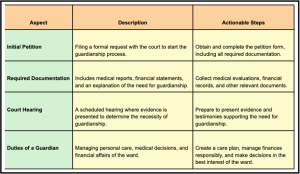Becoming a Ward of the State
An elderly person becomes a ward of the state when a court determines they can no longer manage their own care or finances due to cognitive impairments or lack of family support.
The State makes these decisions for the welfare of the individual. They may be in a situation where they have little to no support from their family or they may have a disability keeping them from managing their affairs. If necessary, the State can assume Guardianship of the individual.
This article from Montana Elder Law discusses the essential details involved in this process. Our attorneys are experienced in every facet of elder law and we welcome you to reach out with questions.
Key Takeaways
- Guardianship is court-appointed: The state steps in when an elderly person can’t manage their own care.
- Reasons for guardianship: Common reasons include lack of family support, cognitive impairments, and severe health issues.
- Legal process involved: Petition, court hearings, and the appointment of a guardian.
- Types of guardianship: Full, limited, temporary, and financial guardianships.
- Impact on rights and care: Guardianship affects the elderly person’s autonomy and decision-making abilities.
Reasons an Elderly Person May Become a Ward of the State
Elderly individuals may become wards of the state due to various circumstances.
One common scenario is the lack of family support. When family members are unavailable or unwilling to take responsibility, the state steps in to provide necessary care and oversight.
This situation often arises when an elderly person lives alone and their health deteriorates without anyone to assist.
Cognitive impairments, such as dementia or Alzheimer’s disease, can also lead to state guardianship.
These conditions often render individuals incapable of making sound decisions regarding their health, finances, and daily living.
Severe health issues, including physical disabilities that limit mobility or self-care capabilities, can further necessitate the appointment of a guardian.
In such cases, the state ensures that the elderly person receives appropriate medical attention and support to maintain their quality of life.
Essential Steps in the Guardianship Process
The Legal Process of Becoming a Ward of the State
The legal process of becoming a ward of the state involves several critical steps to protect the rights and welfare of the elderly individual. It starts with filing a petition, usually by a concerned family member or a state agency.
Once the petition is filed, the court schedules a hearing to assess the individual’s condition and their ability to make decisions.
During the hearing, evidence is presented, including medical reports and testimonies, to determine the necessity of guardianship.
If the court finds that guardianship is required, it appoints a guardian, granting them the authority to make decisions on behalf of the elderly person.
Ward of the State: State-Specific Comparison Table
| Aspect | Montana | California | Arizona |
| Required Documentation | Medical report, petition, notice to family members | Petition, physician’s declaration, notice of hearing | Petition, physician’s report, notification to interested parties |
| Timeframe for Hearing | 30-45 days after petition is filed | Typically within 60 days of filing the petition | Hearing usually set within 30 days of filing |
| Guardian Appointment | Court-appointed, may consider less restrictive alternatives | Court-appointed, based on evidence and physician’s declaration | Court-appointed, based on investigation and hearing |
Types of Guardianship for Elderly Individuals
Full (Plenary) Guardianship
Full guardianship, or plenary guardianship, grants the guardian complete control over the older person’s personal and financial decisions.
This type of guardianship is used when the individual is entirely unable to manage their own affairs due to severe cognitive or physical impairments.
The guardian makes all critical decisions, including those related to healthcare, living arrangements, and financial management. (1)
Limited Guardianship
Limited guardianship gives the guardian authority over specific areas of the elderly person’s life.
This arrangement is suitable when the individual can still make some decisions independently but needs assistance in particular areas, such as managing finances or making medical decisions.
The court clearly defines the scope of the guardian’s authority, so that the individual retains as much autonomy as possible.
Temporary Guardianship
Temporary guardianship is appointed for a short duration, typically in emergencies where the elderly person needs immediate assistance.
This type of guardianship is used when there is an urgent need to protect the individual’s well-being, such as during a health crisis or when they are at risk of exploitation.
The duration and scope of temporary guardianship are limited to the immediate needs of the elderly person.
Financial Guardianship
Financial guardianship focuses solely on managing the financial affairs of the individual.
The guardian is responsible for handling assets, paying bills, and ensuring financial stability.
This type of guardianship is appropriate when the elderly person can manage their personal care but requires assistance with financial matters due to cognitive decline or other issues.
Rights and Responsibilities Under Guardianship
Guardianship comes with significant responsibilities and impacts the rights of the elderly individual.
Guardians are tasked with making decisions in the best interest of the ward, prioritizing their health, safety, and financial security.
However, the ward retains certain rights, such as the right to be treated with respect and to receive appropriate care.
Key Responsibilities
- Healthcare Decisions: Ensuring the ward receives proper medical care and making health-related decisions.
- Financial Management: Handling the ward’s finances, including paying bills and managing assets.
- Daily Care: Overseeing daily living arrangements and ensuring the ward’s needs are met.
Alternatives to Guardianship
Exploring alternatives to guardianship is essential for preserving the autonomy of elderly individuals. One effective option is the power of attorney.
This legal document allows a trusted person to make decisions on behalf of the elderly, covering areas like finances and healthcare without needing court intervention.
Another viable alternative is an advance directive.
Advanced directives include a living will and a healthcare proxy, which outlines the individual’s medical treatment preferences and appoints a person to make healthcare decisions if they become incapacitated. Advance directives provide clear instructions, reducing the need for guardianship.
Supported decision-making is also a growing approach.
It involves a network of trusted advisors who help the elderly person make decisions without taking away their rights. This method promotes independence while providing necessary support.
How to Avoid Becoming a Ward of the State
Taking preventive steps can help elderly individuals avoid becoming wards of the state.
Planning ahead is key.
- Estate Planning: Organize and plan your assets to control how they are managed and distributed.
- Designate a Power of Attorney: Choose a trusted person to make decisions if you become unable.
- Create a Living Will: Specify your medical treatment preferences.
- Establish Advance Directives: Outline your wishes regarding healthcare and appoint a healthcare proxy.
- Maintain Open Communication: Regularly discuss your plans and wishes with family members to ensure they understand your preferences.
Ward of the State Explained | Montana Elder Law
Understanding how an elderly person can become a ward of the state highlights the importance of proactive planning. It is important to learn about all of the options available for these situations, because not every situation is the same.
Montana Elder Law is dedicated to providing expert guidance on elder law issues. We know how difficult these situations can be for individuals and their loved ones. We always want to preserve individual rights, but hard decisions must be made before worse situations arise.
With Montana Elder Law, you will be treated like family, and your voice will be heard. Call today!
Visit our HOMEPAGE for more resources.
Reference:
(1) Montana Judicial Branch, Guardianship and Conservatorship, https://courts.mt.gov/forms/Guardianship





